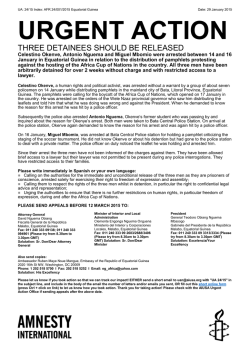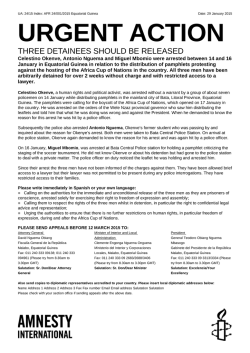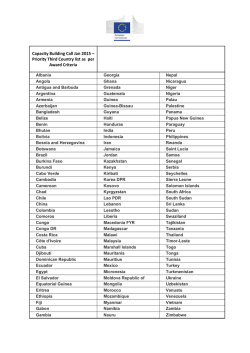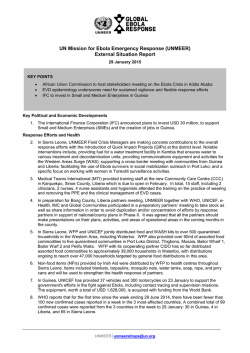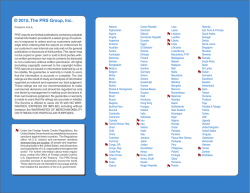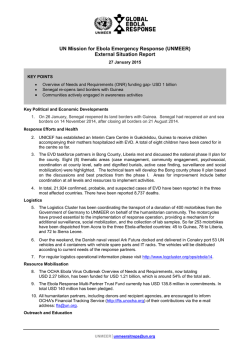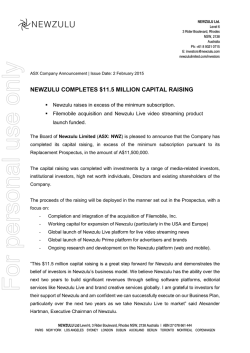
Business with America enhanced for the long term
#EquatorialGuineaTheWorldfolio #OTC2015 #TheWorldfolio Our World Monday, May 4, 2015 EQUATORIAL GUINEA This supplement to USA TODAY was produced by United World Ltd., Suite 179, 34 Buckingham Palace Road, London SW1W 0RH – Tel: +44 (0)20 7305 5678 – [email protected] – www.unitedworld-usa.com Business with America enhanced for the long term The West African nation is making it easier and more secure for international investors to help diversify its economy O ne of Africa’s richest, yet leastknown countries, Equatorial Guinea is now entering the exciting second phase of President Teodoro Obiang Nguema Mbasogo’s ambitious Horizon 2020 plan to transform the country into an emerging economy by the target year with private investors invited to join the party. In the first phase, his government used the nation’s vast petroleum wealth to build the transport infrastructure needed to help diversify Equatorial Guinea’s economy away from hydrocarbons and toward other industries, such as agribusiness and livestock, energy and mining, fishing, tourism, and services. Now, the aim is to attract domestic and foreign investors to these sectors with “I can assure you that the transformation this country is experiencing now is due to the foreign companies, many of which are American, operating here. We are looking forward to more participation from American companies in other sectors beyond oil and gas” TEODORO OBiANG NGUEMA MBASOGO, President of Equatorial Guinea U.S. companies more than welcome. “I can assure you that the transformation this country is experiencing now is due to the foreign companies, many of which are American, operating here,” declares Mr. Obiang. “And we are definitely looking forward to more participation President Barack Obama and First Lady Michelle Obama with President of Equatorial Guinea Teodoro Obiang Nguema Mbasogo and First Lady Constancia Mangue de Obiang in the Blue Room during a U.S.-Africa Leaders Summit dinner at the White House on August 5, 2014 (Official White House photo by Amanda Lucidon) from American firms in other sectors beyond oil and gas.” For many years, Equatorial Guinea was barely on the U.S. radar, neither in the power centers of Washington, nor in the boardrooms of American multinationals, until the West African country took the initial step. “Even though Equatorial Guinea didn’t really interest the U.S. government, when we invited American oil companies to come here, they helped set the stage for the good relations we now have with the United States,” Mr. Obiang explains. Those relations are reflected in the United States’ standing as a leading trade partner. Currently, the U.S. is Equatorial Guinea’s fourth-largest export market after Japan, France and China, and third in providing imports after Spain and China. Around 17% of natural gas con- sumed in the U.S. is from Equatorial Guinea and the country’s largest foreign investors are all American multinationals. Successive U.S. administrations have worked closely with Equatorial Guinea to not only foster economic ties, but also to boost the country’s nascent democracy, as well as improve political freedom, human rights, and the standard of living for all its estimated 750,000 citizens. Indeed, bilateral relations are so good that U.S. passport holders do not need visas to enter the country, with the U.S. one of only three foreign countries accorded that unique privilege. In the most recent signal of Washington’s support for the changes occurring in Equatorial Guinea, President Obiang met with his U.S. counterpart Barack Obama at last year’s U.S.-Africa Leaders Summit in Washington. Situated on the Atlantic Ocean near major international sea traffic routes, Africa’s sole Spanish-speaking country measuring 11,000 square miles (slightly smaller than the state of Maryland) wants to punch above its weight and become, in the words of government officials, “the Singapore of Africa.” It makes sense. The country would be perfect as a logistics platform for its surrounding neighbors on the Gulf of Guinea, easing access for goods and services to a growing and increasingly affluent market of 300 million consumers, as well as increasing Equatorial Guinea’s industrial capacity. “We need to develop our industrial sector and see what we can make here ourselves, with foreign investment assistance, to reduce imports and conserve our foreign exchange,” notes Mr. Obiang. “For example, we could produce cement, which every growing economy needs if it wants to be self sufficient. And that is the aim of Horizon 2020. It is something we are very much focusing on,” he adds. Africa is the continent of the future, Mr. Obiang argues, “because we have natural resources and demographic growth. Equatorial Guinea, of course, will be an integral part of the continent’s development, and we want the United States to join us in building that future for the good of all.” A UNITED WORLD SUPPLEMENT PRODUCED BY: Juan Manuel Rodríguez, Virginia Towers, Gemma Gutiérrez, and Fátima Rúiz Billion-dollar backing for new partnerships The government has highlighted five key sectors packed with business opportunities and set up a $1 billion co-investment fund for ventures that will bring out their full potential Co-investment is the key strategy of the government in luring private investors, both domestic and foreign, to open up the country’s economy to a range of new sectors that officials have identified as potentially profitable. Equatorial Guinea’s Holding 2020 co-investment fund is backed by $1 billion from the government to jumpstart investments in five targeted sectors – agribusiness and livestock, energy and mining, fishing, tourism, and services industries – as well as minimize risk for investors. “We have established the fund so that when an investor brings his or her money, the government can also collaborate in the business,” explains President Teodoro Obiang Nguema Mbasogo. “The reason for the fund is to assure investors their money is safe, and that the government supports them and offers full guarantees that they will recover all capital they invest.” The investment plan is part of the government’s wider program, Horizon 2020, which targets improvements in the country’s transport, health, education, telecommunications and housing infrastructure to firmly position the country as an African success story. “Holding 2020 is the strategic ally for the private sector in our bid for economic diversification and sustainability, as the government has granted it the exclusive competence to represent the state’s interest in all the projects that it will co-finance,” says Holding 2020 General Director Mariola Bindang Obiang. “This means that the partner is not the state, but the Holding itself,” she adds. Before its petroleum resources began generating income in the 1990s, Equatorial Guinea was almost entirely reliant on timber and cocoa exports for foreign exchange earnings. And this time, the government wants to avoid putting all its economic eggs in just one or two baskets. “Once hydrocarbon earnings began to flow into the country,” Ms. Bindang recalls, “the government realized that the priority should be to build or upgrade all the infrastructure that was needed: highways, an airline, telecommunications, conference centers, hospitals, schools, social housing, etc. Now, the priority is to develop the industrial potential of the country in certain sectors starting with agriculture, livestock breeding and fishing, and that means partnering with investors.” These initial developments will help Equatorial Guinea, now a major importer of even the most basic food products, meet its own domestic demand for meat, fish, vegetables and fruit, and in turn become more economically self sufficient. “And once production exceeds what we need to feed our own people, we can begin to consider exporting to other countries after studying the potential markets,” the general director argues. The fund marks an ambitious start to what President Obiang’s administration confidentially sees as a step toward leading the country, and in particular its people, to prosperity and its rightful place in a new Africa, aided by Equatorial Guinean and foreign investors. “We have done so much, so far,” says Ms. Bindang, “but there is still a lot to do to ensure that Equatorial Guinea joins the ranks of emerging nations, which we want to see happen in 2020.” Our World Insert is produced by United World. USA Today did not participate in its preparation and is not responsible for its content 2 EQUATORIAL GUINEA Monday, May 4, 2015 Distributed by USA TODAY Holding 2020 partners private sector to unlock ground-floor opportunities Private sector know-how and public-private collaborations will add value to the country’s raw materials and benefit the nation on both social and economic levels P rivate enterprise figures large in the plans of Equatorial Guinea to meet three ambitious goals for the 21st century: diversify the economy away from hydrocarbons, attract foreign investors with know-how for priority sectors, and provide jobs and training for citizens to boost their income and well being. Major local investors and multinationals are expected to take part in this push for private investment as part of the government’s Horizon 2020 scheme, but smaller investors from both inside and outside the country are also welcome. “We have the determination to achieve the creation of small and medium-sized enterprises that will help ensure the country’s economic diversification,” declares Equatorial Guinea’s President Teodoro Obiang Nguema Mbasogo. In its bid to attract private enterprise, the government has come up with a series of incentive programs covering taxes, customs, and other fiscal issues, as well as streamlined bureaucracy for those companies wanting to invest. The plan also includes a coinvestment fund, called Holding 2020, of $1 billion to match investments by the private sector and provide fiscal safeguards for investors. “We designed this initiative following a series of conferences on how to best diversify our economy, with a special emphasis on private sector involvement in agribusiness and livestock, energy and mining, fishing, tourism and services,” explains Holding 2020’s General Director Mariola Bindang Obiang. “The co-investment fund was created at the same time as Holding 2020 and provides the tools to drive those sectors which we consider a priority. This fund is at the disposal of any investor interested in coming here. “If an investor has an idea for a project of a certain size and cannot finance it on their own or wants to share the risk, “We have the determination to achieve the creation of small and medium-sized enterprises that will help ensure the country’s economic diversification” “The reason for the fund is to assure investors their money is safe, and that the government supports them and offers full guarantees that they will recover all capital they invest” TEODORO OBiANG NGUEMA MBASOGO, President of Equatorial Guinea Holding 2020 is here to assume part of that risk.” Holding 2020 officials are also quick to note that the projects must be profitable and highlight its role as a supportive financial partner helping create new industries for the country. “What interests us at this moment are investors who possess the knowledge that we do not,” Ms. Bindang emphasizes. “We cannot try to create these industries right now by ourselves as we lack the know-how.” Equatorial Guinea is keen to ensure that the plan does not fail as similar schemes have in other petroleum exportdependent countries through mismanagement, corruption, and other bad practices. “It is important the international community understands that this is a commitment conceived and adopted by the government of Equatorial Guinea itself and was not suggested or forced by outsiders,” the general director adds. According to officials, private enterprise is the key to the country’s development. Equatorial Guinea is adamant about not wanting to establish more state-owned and operated companies, but Ms. Bindang admits that it will be a challenge. “At the national level, the private sector is still in its infancy and people still have a lot to learn, especially about issues regarding balancing their books, using trained accountants, obtaining financing, and putting up collateral to guarantee a loan,” she says. Many foreign investors tak- ing a look at Africa get the impression that perhaps it is too late, that all the opportunities have been grabbed and there are no new markets to target. But the Holding 2020 chief disputes that notion, arguing this is certainly not the case in Equatorial Guinea as the private sector is starting from scratch and a virgin market still exists. “Of course it is not too late because the industries we want to establish do not exist. This is the ideal moment to invest in this country because we want to produce just about everything,” she explains. “Let me give you an example. We produce no fruit juices but Equatorial Guineans are big consumers of fruit juices, which have to be imported. We have the raw materials – oranges, mangos and guava – so all we need is for someone to come here and use these fruits to make and bottle juice. “We also grow pineapples and we could export them to European Union member countries like so many other African countries are doing. If they can do it, why not us?” A juice factory, pineapple processing plant or any other manufacturing project, would provide jobs for local people, especially the young, which in turn would generate income to improve the standard of living. “This will reduce our levels of poverty, which is another major goal of the government’s overall macroeconomic plan: implement methods to help eliminate poverty and increase the well being of all,” Ms. Bindang adds. Successful private businesses turning out in-demand products will also make the country more economically self-sufficient, reduce the country’s import bill and foreign exchange outlay, and could even lead to Equatorial Guinea exporting a range of goods to markets near and far. “Among the economic sectors we have identified as priorities, we cannot right now point to a specific market for whatever we produce,” the general director says. “First, we will have to see which of our products are competitive in which foreign markets and take it from there.” For now, Holding 2020 wants to get the word out to the world on the plan, its targeted sectors, and the advantages, incentives, guarantees and requirements for investors. “Our PR strategy includes articles in the printed press, the internet, and advertising on the leading global television channels,” says Ms. Bindang. “And we are considering organizing a type of international road-show to let potential investors know just how smart it would be to bet on Equatorial Guinea’s future.” “There are real benefits for investors who come here” The government has created a raft of tax and training incentives that present great advantages to investors W ith many dozens of countries around the globe vying for foreign investment and offering potential partners all manner of incentives, the government of Equatorial Guinea knew it needed to make sure its enticements for possible investors were world class. Holding 2020 General Director Mariola Bindang Obiang points out that Equatorial Guinea’s political stability and its carefully thoughtout incentives under the coinvestment fund project have been meticulously designed for attracting domestic and foreign investment. “When you look at Equatorial Guinea, it is quite clear that it is a very peaceful country with no history of conflict and our people like to settle their differences through dialogue, not disorder,” she says. “Apart from that, there are real benefits for investors who come here because the Equatorial Guinean currency, the CFA franc, is fully convertible and there is no problem repatriating profits.” In addition, the currency has a fixed parity with the euro backed by agreements with the French Ministry of the Treasury and there is no hindrance by the government on the free flow of capital. “This is a great advantage for investors,” Ms. Bindang highlights. Liberal monetary policy is just the beginning when it comes to reasons to invest. Other incentives cover such issues as taxation, with companies creating new jobs benefitting from a 50% reduction of taxable income related to salaries for Equatorial Guinean nationals, for a period of 18 years. Plus, companies providing training to nationals enjoy a reduction of their taxable income of 200% of the amount they dedicated to training Equatoguineans. “In addition, an incentive for the export of nontraditional products is that companies receive a credit certificate for the payment of any tax or customs duties equal to 15% of foreign currency received on account in commercial banks in Equatorial Guinea,” says Ms. Bindang. The government’s economic planners are particularly keen on attracting investment to the country’s more remote areas. To promote that, companies involved in projects away from large urban centers can benefit from total amortization of their outlay on infrastructure. These companies will also be exempt from payment of taxes applicable to activities in remote areas, with the exception of income and sales tax, as well as customs duties and other applicable fees. “All of these are benefits that any company which comes here to set up a business can enjoy,” the general director explains. Other government assistance includes providing consultancy, advice and in-depth studies on sectors and markets the investor is interested “Holding 2020 is the strategic ally for the private sector in the country’s economic diversification process. The government has granted it the exclusive responsibility to represent the state’s interests in all projects it is going to co-finance, meaning that the partner is not the government but the holding itself” MARiOLA BiNDANG OBiANG, General Director of Holding 2020 in, as well as help with finding any finance needed. “Holding 2020 will partner with other investors, both Equatorial Guinean and foreign, to co-finance projects, meaning each party will put up its share of the capital,” says Ms. Bindang. “If there is an investment partner with the necessary knowledge and whose project is viable and profitable, we can steer them toward financing as the banks are going to play a very important part in our economic diversification.” Equatorial Guinea is especially keen to lure investors from the United States, like those who led the way by exploring and drilling for the oil and gas that triggered the country’s new prosperity. “If American investors are interested in entering other economic sectors to help us diversify,” Ms. Bindang says, “we would be absolutely thrilled.” She also points out that as the only Spanish-speaking African state, Equatorial Guinea is uniquely equipped to welcome investors from Spain or Latin America. Gabriel Mbaga Obiang Lima, Minister of Energy, Mines and Industry, stresses that while Spanish-speaking investors may have a few linguistic and historical advantages, the country is keen to collaborate with a wide range of nations and will be impartial in choosing who it partners with. Belgium and Lebanon are already on board as potential investors, and India, the minister suspects, will likely be the country’s biggest investor. “We have built so many things,” explains Mr. Obiang Lima. “But we have not broadcast our achievements to the international community,” he says. “Going forward, our responsibility is to communicate, diffuse, and inform people about what we are accomplishing in Guinea.” Our World Insert is produced by United World. USA Today did not participate in its preparation and is not responsible for its content EQUATORIAL GUINEA Distributed by USA TODAY B uoyed by the funds from oil exports as well as the prestige of its newly discovered resources, Equatorial Guinea has begun to leverage its more prominent place on the world map to improve itself in ways that are not purely economic. Well aware that no country can thrive by oil alone, President Teodoro Obiang Nguema Mbasogo is determined to ensure that his country optimizes another of its finest assets: its privileged location as a gateway to Africa. With the Atlantic Ocean running along its western coast, Cameroon to its north, and Gabon running along its eastern and southern borders, Equatorial Guinea is a self-proclaimed “Singapore of Africa” – a strategically placed portal to a market of over 300 million consumers from nearby countries. As such, Equatorial Guinea is keen to strengthen ties with its neighbors. It is one of the six member states of the Central African Economic and Monetary Community (CEMAC), which seeks to increase peace, security, and economic integration and diversification in the region, and it shares a regional Central Bank (BEAC) with other CEMAC members. In 2014 the republic also became a full member of the Community of Portuguese Language Countries (CPLP). The only Spanish-speaking country in Africa, with French its second official language, it added Portuguese as a third official language as part of its CPLP membership bid. Further adding to its esteemed value as a trade and transport hub is the fact that Equatorial Guinea also has some of the best ports, airports, and roads in the region – a region, it is worth mentioning, where even the most basic of infrastructure is still not uniformly available. Some 80% of the national roads have asphalt, which is a huge advantage, especially during the muddy rainy season that plagues large swaths of Africa. New airports have been built in Corisco, Mon- Developed infrastructure and regional links lead to 300 million consumers Good relations and investments in infrastructure have created an ideal route into Central and West African markets not the product of cooperation with third parties; these were all investments funded by the state,” explains the President. But now that this basic infrastructure is in place and the country has established a proven record of political and economic stability, it has successfully positioned itself to become more than just a country where foreign companies source their petroleum. In fact, Equatorial Guinea has distinguished itself as a ready, willing, and eminently well- Monday, May 4, 2015 invest in the country across a variety of sectors, including mining, agriculture, tourism, and fishing.” Mariola Bindang Obiang, General Director of Holding 2020 – the co-investment fund created by the government to facilitate the participation of the private sector in the diversification of the local economy – largely echoes these sentiments. She explains that while other neighboring countries went through periods of prosperity following the discovery of oil resources, Equatorial Guinea’s trajectory has been different. The government had the foresight to use the money earned from the exploitation of the country’s oil resources to build infrastructure – the roads, buildings, airports, airlines, telecoms, conference centers, hospitals, schools, and housing units that form the foundation of a more developed society. Once in place, the government could then move on to developing the industrial fabric of the nation, which at present, explains Ms. Bindang, Holding 2020’s General Director Mariola Bindang Obiang, left, with the co-investment fund’s Deputy Director Patricia Mbasogo Obiang Lima gomeyen, and Annobon, and the ports of Bata, Malabo and Annobon have been expanded. Following this development, the central government has been more easily able to plan and construct schools, hospi- tals, housing units, and even new tourist and sports installations, such as those built for the African Cup of Nations. Equatorial Guinea has thus become a preferred logistics platform in the Gulf of Guinea, and an ideal point of entry to West Africa for new investors. “All of this transformation, all that we have here in this country – roads, buildings, the best hospitals, shopping centers, universities – these are prepared partner that is ripe for long-term foreign investment. Following the completion of the first phase of Equatorial Guinea’s Horizon 2020 plan, the country has now entered phase two of the plan, which involves putting an emphasis on services that will benefit local communities. “The second phase of the plan is centered around developing the economy through private-sector initiatives,” says President Obiang. “We want to encourage both local and foreign investors to is in its most primary stages. “Any investor who arrives now will see that it is the perfect time because we want to produce all types of things, and we have the basic infrastructure to facilitate production, but no production industries exist yet,” she says. In addition, in a bid to attract investors with industrial savoirfaire, the government is offering tax breaks for companies that create a certain number of new jobs, or train local employees with the key skills to keep new industries up and running. Locals have a hand in region’s best roads Equatoguinean talent makes up 90% of employees at Sogea Satom, which for almost 20 years has been helping asphalt 80% of the country’s roads P art of the French Vinci Construction giant, Sogea Satom has deep African roots. Since its first forays into the continent in the 1930s, the company has been operating on African soil for over 80 years, where it is currently active in more than 20 countries and employs no fewer than 10,000 people, including 500 expatriates of 23 different nationalities. Although it did not arrive in Equatorial Guinea until 1996, the company has quickly built up a favorable rapport with the local population, not to mention the complex network of roads, ports, buildings, hydraulic structures, and other infrastructure that it has helped put into place. While most construction companies arrive in Guinea via Malabo, the capital, working in the small villages of Mongomo gave the company on-the-ground experience in small, traditional Guinean villages, and linked it closely to local populations. To date, Sogea Satom has completed projects in Bata, Mongomo, Evinayong, Cogo, Ebebyin, and many other towns in Equatorial Guinea. It also built a base camp in Punta Europa so that oil companies could start oil production, in addition to working on the maintenance and improvement of the Malabo drinking water system. The common thread throughout its projects is an awareness of the communities where it operates, something that President Teodoro Obiang Nguema Mbasogo greatly values. “The objective of our infrastructure plan is to make it easier for citizens to play their part in the economic development of the country,” explains Mr. Obiang. “If citizens can each attain a level of personal well 3 being, then the entire country benefits.” Operating within this frame of mind, Sogea Satom has taken a rather grassroots approach to its work in Equatorial Guinea. Twelve years ago, the country had only one paved highway serving Bata-Mongomo. Now, forest track has been replaced by a network of roads, 80% of which are paved and capable of handling large capacity transportation. Airports and seaports have also been built or refurbished to high standards, offering transport possibilities that would have been unimaginable just over a decade ago. Sogea Satom’s new general director, Frédéric Perrin, is building on the progress and accomplishments his predecessor, Frank Casteleyn, achieved over the past decade, particularly with regard to engaging the local population Although things are visibly improving, Sogea Satom’s role remains the same: to work hand in hand with Guineans to make improvements that will serve them not only in the present, but also in the long term. As a testament to the company’s commitment to the local population, 90% of Sogea Satom’s employees – across all levels of responsibility – are local Guineans. As much as this benefits the local economy through job creation, Sogea Satom also benefits from the arrangement. By engaging with the local population at such a fundamental level, the company learns to adapt and optimize its workflow to the Guinean way of life. It can also train local staff to work within its established ecosystem of rules and regulations for the workplace, the environment, and the safety of its workers out on the field. Much of what Sogea Satom has accomplished in the country over the past decade, particularly with the local population, was realized through the leadership and vision of the company’s former General Director, Frank Casteleyn. While Mr. Castelyn left his position in February to become Sogea Satom’s Deputy Regional Manager for Southern Africa, Frédéric Perrin – previously the head of the company’s East Africa operations – has taken over the reins in Equatorial Guinea looking to continue the good work of his predecessor. Bringing with him years of experience of infrastructural development on the African continent, Mr. Perrin takes Sogea Satom forward as not only the company goes through transition, but also at a time of significant transformation for the country itself. With companies like Sogea Satom in the driving seat of this exciting change in Equatorial Guinea, Mariola Bindang Obiang, the General Director of the diversification-focused Holding 2020 fund, believes that combined with the country’s strategic location, Equatorial Guinea can be a huge asset to any investor who wants to reach new African consumers. “It was once very difficult to lure investors,” she explains. “We had nothing.” But now, from airports to hotels, restaurants, ports, and roads, the country has it all. “Any industry that enters production in Equatorial Guinea will easily be able to distribute its goods to neighboring countries in the region,” asserts Ms. Obiang. Our World Insert is produced by United World. USA Today did not participate in its preparation and is not responsible for its content 6 EQUATORIAL GUINEA Monday, May 4, 2015 Distributed by USA TODAY New investments in petroleum sector highlight potential for development The country’s traditional engine of the economy holds opportunities for expansion beyond extraction and production, and its appeal is not lost on investors A lmost 47 years of independence from Spain have brought many changes to Equatorial Guinea. The primary reason for the nation’s developments – as well as those enjoyed by other nations in the region – is the oil industry. Yet the government is planning many more with its Horizon 2020 plan to diversify its revenue sources, reduce poverty, and increase infrastructure. The energy sector is eager to continue playing a central role in the country’s progress, according to Gabriel Mbaga Obiang Lima, Minister of Mines, Industry and Energy. “It has been the engine that has driven economic growth,” he says, and the ministry is working hard to continue exploiting the country’s natural oil resources. In December 2014, the ministry signed an agreement with Taleveras, one of the leading suppliers of crude oil and refined petroleum products in West Africa. The venture will construct Africa’s largest oil storage terminal at Punta Europa on the island of Bioko, and will be ideally situated to serve West Africa’s main oil supply and demand centers. To be developed in stages, the Bioko Oil Terminal is expected to have a total storage capacity of 1.2 million cubic meters for refined products and crude oil by the end of its first two phases. “Since 1991 we have been working on diversifying the hydrocarbon industry,” says Mercedes Eworo Milam, General Director of Hydrocarbons for the Ministry of Mines, Industry and Energy. “We also have a liquefied natural gas (LNG) plant, a methane plant, and projects in areas such as petrochemicals.” As sustainability is a key component of the Horizon 2020 economic plan, diversification of Equatorial Guinea’s other industries and products is also important. Mr. Obiang Lima points to the ministry’s successes: “We have various agreements and anticipated projects to diversify the industry and open the door to markets for new products.” Equatorial Guinea has long invested its own money into the nation for development. According to President Teodoro Obiang Nguema Mbasogo: “We are investing all of the proceeds obtained from natural resources in our country. All of our transformations and the things we have here in Equatorial Guinea have not been obtained from coop- electricity was greater than its demand, so Equatorial Guinea is seeking to connect with new investors in industries that require a great deal of electricity. In addition, it is working to win over companies within the nation that receive their power from private sources. Moreover, it is striving to ensure that all residents of the country have access to electricity, no matter how remote their location may be. “We cannot have indus- ment in infrastructure so that the basis for future growth could be established. Thus, many elements were constructed, including highways, ports, airports, and government infrastructure. The program’s focus is changing in the second phase. “First, it is important to continue with specific investments in infrastructure that remain to be implemented,” Mr. Obiang Lima clarifies. “But principally, in this second phase, investment is going to be focused they will benefit because they will arrive at a country in which infrastructure already exists and as a result is a much wiser choice for setting up a company.” The country’s infrastructure and power supply are not its only selling points for foreign investors. While the nation’s size may initially seem insignificant to those looking to invest, it is actually a benefit. “In Equatorial Guinea we emphasize the Ministry of Mines as the only representative of “We have various agreements and anticipated projects to diversify the industry and open the door to markets for new products“ “It is important to continue with specific investments in infrastructure that remain to be implemented” “In this second phase [of Horizon 2020], investment is going to be focused on social sectors, specifically on education and health” GABRiEL MBAGA OBiANG LiMA, Minister of Mines, industry and Energy eration or from bank loans; they are investments made by the state.” As a result of this approach to development, the oil industry is financing much of the country’s diversification. Mr. Obiang Lima explains that the ministry is “earmarking much of the profits from the oil industry for the development of electricity, because we believe that this is one of the products that will benefit not only our economy, but also the entire region. That is, we can supply enough for our own market, and also enough for exporting.” In fact, as of 2013, the nation’s ability to produce trialization without electrical energy,” says Marcelino Sima Mba, General Director of Segesa, the national electricity company based in Malabo. “A country in darkness can never develop. One of our principles is ‘electricity for all.’ The government of the Republic of Equatorial Guinea, through the Ministry of Mines, Industry and Energy has constructed significant electrical infrastructure.” This infrastructure includes power plants with capacities of 120MW, 150MW and 200MW. Indeed, the first phase of the Horizon 2020 program featured aggressive invest- on social sectors, specifically on education and health.” Future generations will benefit from the ministry’s focus on diversification and infrastructure. Mr. Obiang Lima believes that these generations “are going to find an established infrastructure, which will make additional development much easier. They will be able to dedicate more time to education, health, women, children, and those who are less fortunate.” Equatorial Guinea’s citizens are not the only ones expected to benefit from Horizon 2020 and wider access to electricity. “As far as investors are concerned, the government for the hydrocarbon industry. This facilitates everything for an investor, because it is different speaking with separate ministry departments, with different government entities, than it is dealing with just one representative,” Ms. Eworo points out. And Equatorial Guinea’s geographic location makes it ideal for investors as well. With Cameroon to the north, Gabon to the south, and the Congo Republic and Central African Republic to the east, access to Equatorial Guinea means access to a potential consumer base of 300 million people, all within less than 400 kilometers. The nation’s stability, which has contributed to the electricity industry’s growth, is another advantage for foreign investors. “All development plans have been established, and each area and ministry knows exactly what to do,” says Segesa’s Mr. Sima Mba. “Equatorial Guinea’s development and growth have been meteoric, because we have learned from the mistakes and successes of our neighbors.” There is stability among citizens as well. “People from different tribes live in Equatorial Guinea,” Ms. Eworo explains. “We live in harmony. Certainly, all societies have problems, but clearly we are all behind the President. In our industry and in others, we have never known of any desire to sabotage [the work we are doing]… We are in a situation that is well under control, in which we all clearly see what our priorities are. This is an incentive for investors.” In fact, investors who come to Equatorial Guinea soon find themselves part of the community. “Investors, that is, the actual individuals, integrate themselves into the communities and live peacefully,” adds Ms. Eworo. Investors come not to just profit: they come to develop their own lives and, as a result, have a mutually beneficial relationship with Equatorial Guinea. “We have always done all we could to show the world that it is not size that defines Equatorial Guinea, but its ideas,” says Ms. Eworo. Mr. Obiang Lima adds: “The importance or power of a country is not reflected by the number of inhabitants, but by the quality of work and production. We have focused on how to develop a country through the oil sector, and many African countries have even followed our example. We were among the last to discover oil, but we have managed to develop the country from those resources. As a brand, although we may be small, we have economic discipline, and we have a huge development. Our World Insert is produced by United World. USA Today did not participate in its preparation and is not responsible for its content EQUATORIAL GUINEA Distributed by USA TODAY Monday, May 4, 2015 7 Greater energy mix sparks new enterprises A new logistics supply center for electrical materials and a floating electrical power plant feature among the new enterprises getting involved in a changing electricity sector, with studies into the viability of solar and hydro power opening further opportuntities for businesses T he government’s Horizon 2020 plan has done a great deal to propel Equatorial Guinea toward its goals, however work still remains to be done for the country to completely fulfill its potential. As the government has declared that the process of providing reliable national access to electricity is one of Horizon 2020’s principal strategies, Segesa, the national electricity company based in Malabo, proudly occupies a central role in the development plan. Segesa was formed in 2001 as a result of a merger between Energe, Equatorial Guinea’s former national electric company, and its rural counterpart Soner. The union resulted in the electricity sector’s restructuring, but another shake-up was necessary a few years ago to reduce inefficiencies and to improve service. Due to the stabilization of Segesa’s operations, three distinct organizations were created: Segesa Generation, which is in charge of the everyday functioning of the country’s electrical power plants; Segesa Transmission, which is responsible for the state of the transmission networks, transformers, and other such infrastructure; and Segesa Commercial, which oversees the flow of electricity to the end-consumer. All three units of Segesa maintain the same general supervision and coordination by a central authority. Currently, approximately 70% of the utility is owned by the state, and the remaining 30% is held by a group of private investors. Segesa serves as the operator, rather than a constructor, in the electricity sector. Two independent grids take care of electricity distribution. One connects the mainland’s major popula- tion centers, and the other is on Bioko Island, which serves the capital Malabo and also Luba, an oil-export terminal and the secondlargest city in the country. At any given time, the company may be developing 20 or more electrical energy projects in the areas of production, transport, distribution, and commercialization. Estimates for the amount of money invested into these projects hover around $2 billion, but the likely return on that investment cannot be calculated: the country can now meet its increasing demand for power, and in fact is capable of producing more electricity than it consumes – a situation that it is working hard to cultivate and perpetuate. Segesa has been able to reach this enviable situation via the many projects it has undertaken in the last decade or so. A hydroelectric power plant at Djibloho with 120MW capacity; a transmission and conversion line at Djibloho; a 60kV transmission network in the city of Malabo; expansion of a turbo-gas power plant to 126MW; a 33kv line at Pico Basile (the highest mountain on the island of Bioko); electricity in the new city of Sipopo completed in 2011; and the remodeling of electric facilities in Ebibeyin and Mongomo (both cities in the far eastern part of the country) have all contributed to the success in electricity that Segesa and the people of Equatorial Guinea enjoy today. Toward the end of 2014 Segesa signed an agreement with ASPI Group Equatorial Guinea, a subsidiary of the Bulgarian company ASPI Green Energy Limited, to create a new logistics and supplies center located in the new Industrial City of Mbini (CIM), called Segesa CIM. A 120MW powership from Turkey is one of the new power-generation sources being developed The joint venture will supply materials of tested and certified quality, produced by leading manufacturers in the electricity industry. The Minister of Mines, Industry and Energy, Gabriel Mbaga Obiang Lima, says about the agreement: “Segesa Holding, in its process of industrialization put forth by the government of the Republic of Equatorial Guinea, has seen the opportunity to make a decisive boost to the energy sector by diversifying its production and commercial activities.” In fact, Segesa, along with the Ministry of Mines, Industry and Energy, has adopted diversification and sustainability as its focus. One key target is to retire 90% of the nation’s oil-powered electricity plants by the year 2020 – a goal that points to the seriousness with which Equatorial Guinea regards sustainability. As such, the country is looking at other means of generating electricity to replace the oil-powered plants that will be retired. For example, Segesa will be involved with studies that have been ordered by the government that will focus on the viability of solar and wind power installations on the island of Corisco, which has no significant hydropower resources, and Annobon, whose population is around 21,000. Marcelino Sima Mba, General Director of Segesa On November 28, 2014, shortly after the Africa-Turkey Summit that took place in Malabo, the Ministry of Mines, Industry and Energy signed an agreement with the Turkish company Karadeniz Holding for the provision of a 120MW powership – an innovative floating electrical power plant that consumes gas to generate electricity. The move further highlights the Guinean government’s resolve to tap every aspect of the country’s power-generation potential. Hydropower is another way Equatorial Guinea plans to gain an edge over its regional neighbors. “The production of a megawatt or kilowatt by a hydroelectric power plant costs less than one produced by a gas or thermal plant, which would see an adjustment in consumer prices for electricity,” says Marcelino Sima Mba, Segesa’s General Director. “We also intend to set the price per kilowatt for energy produced by solar panels and the solar industry.” The ultimate goal is selling electricity at the lowest prices in the region. Through price stabilization, ample electricity supply, and excellent infrastructure, Segesa and the nation aim to attract foreign investors to set up companies in the country, to partner with its citizens, and to create a mutually beneficial relationship between the foreign investors and the people of Equatorial Guinea. “The message that I would give to potential investors is: don’t be afraid. Fear causes delays. Instead, inform yourselves: what is Equatorial Guinea, where is it, what potential does it have, and which advantages does Equatorial Guinea offer to investors?” Mr. Sima Mba advises. “With respect to foreign investors, I have to say that Africa is not always shown in the best light by the media. People do not know how we actually live here.” The ability to potentially become an energy exporter is part of change in image the general director would like to see in international impressions of his country. “My dream is for Equatorial Guinea to be like Ghana, like the power plant at Aksombo [dam] that sells energy to Nigeria, to Lomé [in Togo], to Benin and to Burkina Faso. I want Equatorial Guinea, in the future, to be able to export energy to Cameroon, Gabon, Nigeria, and Angola, via an underground maritime network. This is Equatorial Guinea’s potential, and our idea is for Segesa to be the economic engine of the post-oil era,” Mr. Sima Mba explains. “In fact, Cameroon and Gabon have sought electricity provision from us. We believe that energy must be the post-oil source of wealth. And Segesa will play an important role in this.” President Teodoro Obiang Nguema Mbasogo has expressed similar sentiments: “I believe that the vision of Africa, today, is that we have to transform the continent and end the idea that Africa is the poorest continent in the world. This is what we have to do.” With the government’s Horizon 2020 plan and the efforts of entities such as Segesa, Equatorial Guinea is well on its way to making that vision a reality. Our World Insert is produced by United World. USA Today did not participate in its preparation and is not responsible for its content 8 EQUATORIAL GUINEA Monday, May 4, 2015 Distributed by USA TODAY The best choice for producing offshore in West Africa Political stability, the absence of terrorism, enormous reserves, and a flexible and pro-American government have made Equatorial Guinea a go-to country for U.S. hydrocarbon companies T here is no doubt that “diversification” is the buzzword du jour in Equatorial Guinea. Yet despite all the attention cast upon the up-and-coming sectors, the hydrocarbon industry continues to anchor the national economy and will unquestionably do so for years to come while the others find their footing. Moreover, as oil and gas are effectively fueling economic diversification, it is imperative that it maintains momentum. Mercedes Eworo Milam, General Director of Hydrocarbons at the Ministry of Mines, Industry and Energy, goes further, saying that oil and gas not only funds diversification, but has inspired it as well. “I believe that we have found ourselves through hydrocarbons,” she says. “Being such a demanding sector, the ministry had to use all of its energy in developing it, and in doing so, discovered its own potential. When we all saw what the ministry was capable of doing, we thought why not channel this vigor into all the other sectors?” Equatorial Guinea is one of Africa’s smallest countries in terms of area, but it certainly punches above its weight in hydrocarbon reserves. The third largest oil producer in the continent, as of January 2015, it boasted 1.1 billion barrels and 1.3 trillion cubic feet of proved crude oil and natural gas reserves, respectively, according to the U.S. Energy Information Administration. Most of the country’s reserves are located offshore near Bioko Island – not surprising, given the fact that its maritime territory is 11 times larger than its land area. Total oil production has slid downwards over the past several years, from its peak of “We are pragmatic, we like fast-tracking, and this is why mainly North American businesspeople have chosen us” MERCEDES EWORO MiLAM, General Director of Hydrocarbons at the Ministry of Mines, industry and Energy 375,000 barrels per day (bdp) in 2005 to 270,000 bpd in 2014. Maturing fields coupled with a heretofore lack of new significant discoveries can be blamed for this decline, but the government is hopeful that last year’s licensing round will bring about better results. One of the objectives of this recent round, which offered up all available blocks, was to attract more oil majors than the previous round. Nevertheless, Energy Minister Gabriel Mbaga Obiang Lima says the country will “continue working with small and medium-sized American exploration and production firms because they tend to make fewer mistakes since they risk a larger part of their capital with each decision.” U.S. companies have been the cornerstone of the nation’s oil and gas industry since the beginning. ExxonMobil, Marathon Oil and Noble Energy, for example, were the first exploration companies to strike black gold in its waters in the 1990s. As a result of these finds, the country’s economic pulse immediately began to quicken, attaining doubledigit growth thanks to the surge of foreign investment. After ExxonMobil brought the Zafiro field online in 1995, the country’s GDP grew by an extraordinary 66% in 1996. The following year, the economy took a flea-like jump again, expanding by an unprecedented 150%. ExxonMobil continues to make headlines. In April this year it ratified a production sharing contract (PSC) it had signed in January with Production Equatorial Guinea (Offshore) Ltd., GEPetrol and the Ministry of Mines, Industry and Energy, to explore Block E.G.-06. According to Mr. Obiang Lima, the ratification of the PSC “signifies the start of a new adventure between old acquaintances and is expected to be as successful as the first one.” “The agreement with a supermajor like ExxonMobil is a major vote of confidence in Equatorial Guinea, even as global commodity prices remain depressed,” he added. “This is added proof that offshore continues to be an appealing jurisdiction for the exploration of hydrocarbons.” The drop in crude oil prices has deterred some investors, but as Ms. Eworo points out, “This is not the first time prices have fallen and it highlights the importance of working with companies that have a longterm vision.” A licensing round, held between August and October 2014, offered up all available blocks She adds that Equatorial Guinea can offer investors a stable and safe working and living environment – something that other countries in the region cannot. And in return, she expects that investors view themselves as partners in national development, rather than players who merely reap the riches and leave. U.S. investors, in fact, were the ones who introduced the concept of corporate social responsibility in the country. “The idea of leaving a legacy is a cultural thing for Americans,” says Ms. Eworo. As a gesture of gratitude and confidence in American investors, Equatorial Guinea offers them various incentives, such as visa-free entry. Ms. Eworo claims that it has become a favorite partner for the U.S. because “American companies are 100% pragmatic.” “We have always brought to the table practical solutions so that projects of mutual interest can move forward,” she adds. “We are pragmatic, we like fasttracking, and this is why mainly North American businesspeople have chosen us.” Our World Insert is produced by United World. USA Today did not participate in its preparation and is not responsible for its content
© Copyright 2026
